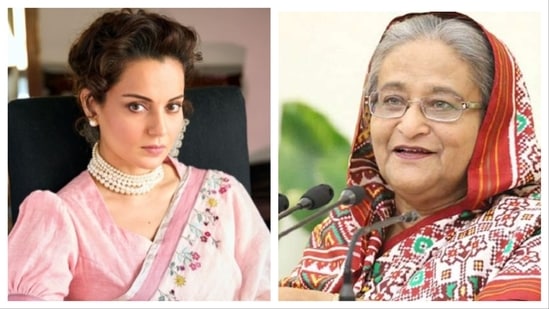
"Emergency" delves into India's political landscape during the 1970s, focusing on then-Prime Minister Indira Gandhi's declaration of a state of emergency from 1975 to 1977. A significant subplot depicts the assassination of Sheikh Mujibur Rahman in 1975, a portrayal that has sparked controversy in Bangladesh. Officials argue that dramatizing this sensitive historical event could incite public unrest and exacerbate existing diplomatic tensions.
The ban comes amid a backdrop of deteriorating relations between India and Bangladesh. In August 2024, former Bangladeshi Prime Minister Sheikh Hasina was ousted following mass protests and subsequently sought refuge in India. The interim Bangladeshi government, led by Muhammad Yunus, has since issued formal requests for her extradition to face charges, including crimes against humanity—allegations she denies. India has acknowledged these requests but has not taken definitive action, leading to further diplomatic strain.
Reports of attacks on Hindu minorities in Bangladesh have prompted protests in New Delhi, with demonstrators urging the United Nations to intervene. These incidents have intensified public scrutiny and criticism of Bangladesh's interim government, further complicating bilateral relations.
The ban on "Emergency" is perceived by some analysts as a reflection of the broader geopolitical tensions between the two nations. Bangladesh's interim government has been reassessing its foreign policy, with indications of a potential shift towards strengthening ties with China. This realignment could have significant implications for regional dynamics, especially considering China's growing influence in South Asia.
Kangana Ranaut, who not only stars as Indira Gandhi but also directs the film, has faced multiple challenges leading up to the release. The film's release was postponed several times due to certification delays and political sensitivities. In Telangana, concerns raised by Sikh community members led the state government to consider a ban, though the film eventually secured clearance from the Central Board of Film Certification.
In response to the Bangladesh ban, Ranaut's production team expressed disappointment but emphasized their respect for the country's regulatory decisions. They reiterated that "Emergency" aims to present a historical perspective on events in India and is not intended to interfere in the internal matters of neighboring nations.
The ban has elicited mixed reactions within Bangladesh. Supporters of the decision argue that the film's portrayal of Sheikh Mujibur Rahman's assassination could reignite painful memories and destabilize the current political climate. Critics, however, view the ban as an act of censorship that stifles artistic expression and hinders cultural exchange.
As the release date approaches, "Emergency" has garnered significant attention in India, with expectations of robust box office performance. The film's narrative, focusing on a pivotal period in Indian history, has sparked discussions on the portrayal of political events in cinema and the responsibilities of filmmakers in handling sensitive historical subjects.
The situation underscores the intricate relationship between art, politics, and diplomacy in South Asia. While films like "Emergency" strive to depict historical events, their reception is invariably influenced by contemporary geopolitical contexts. The ban in Bangladesh serves as a reminder of the enduring impact of historical narratives on present-day international relations.
As of now, there is no indication that Bangladesh will reconsider its decision regarding the film's release. The Ministry of Information has stated that any future decisions will be contingent upon improvements in diplomatic relations and assurances that the film will not disrupt public order.
In the meantime, "Emergency" is set to open in theaters across India, with international releases planned in select countries, excluding Bangladesh. The film's reception in India and other markets may further influence discussions on its content and the broader implications for India-Bangladesh relations.
The intersection of cinema and politics continues to be a complex and sensitive domain, particularly in regions with shared histories and intertwined futures. The case of "Emergency" exemplifies the challenges faced by artists and policymakers in navigating this intricate landscape.
As audiences prepare to engage with "Emergency," the film stands as a testament to the enduring relevance of historical events and their portrayal in contemporary media. The discourse surrounding its release highlights the power of cinema to evoke reflection, debate, and, at times, controversy.
The ban in Bangladesh adds a layer of complexity to the film's narrative, underscoring the profound impact of historical representation on current diplomatic relations. It remains to be seen how this development will influence future cultural exchanges between the two nations.
For now, "Emergency" proceeds with its scheduled release in India, inviting audiences to revisit a tumultuous chapter in the nation's history through the lens of cinema.
As the film makes its debut, the conversations it sparks will likely extend beyond the screen, prompting reflection on the delicate balance between artistic expression and geopolitical sensitivities.
The narrative of "Emergency" serves as a reminder of the intricate interplay between past and present, art and politics, and the enduring quest for understanding and reconciliation in the face of complex histories.
In the realm of cinema, as in diplomacy, the stories we tell and the manner in which we tell them hold the power to bridge divides or deepen rifts. The unfolding story of "Emergency" and its reception across borders will contribute to this ongoing dialogue.
